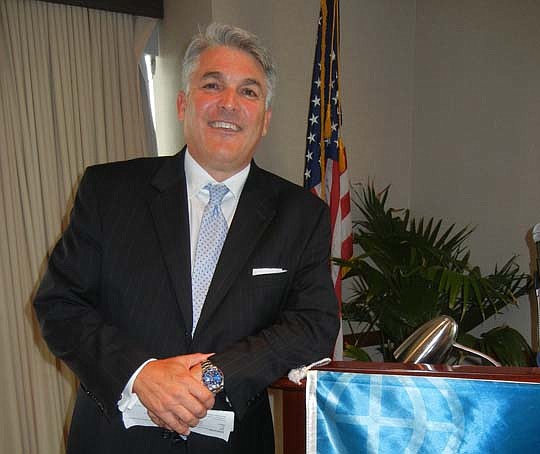
Florida Rep. Lake Ray wants the port of Jacksonville to secure the state money it needs for development and is working with port CEO Paul Anderson to make that happen.
“We know we are not going to ever be able to outvote Miami or Tampa,” said Ray, the District 17 representative and one of the 11 members of the Duval Legislative Delegation.
North Florida’s population is less than South Florida, and “our delegation can’t overcome that.”
“But by properly developing legislation, it will provide the path for JaxPort to be well funded and get the money it needs for the projects that need to get done,” he said Tuesday in a telephone interview after Anderson spoke to the World Affairs Council of Jacksonville.
Anderson spoke to about 105 people at the Global Business Luncheon co-hosted at The River Club Downtown by the World Affairs Council and The Gate Governors Club.
Anderson was introduced by former state Sen. Tony Hill, who left his District 1 Senate seat to become the federal government liaison for Mayor Alvin Brown.
Hill talked about the port-related 65,000 area jobs and their $44,000 average annual wage.
Anderson, who joined the JPA about nine months ago, outlined the port’s issues: deepening the channel, fixing the Mile Point navigational challenge, upgrading the port terminal infrastructure and other projects.
He also talked about opportunities that included business from the expansion of the Foreign Trade Zone to five counties, and he spoke about the successes of public-private partnerships like that of the port and the TraPac terminal that handles Asian cargo.
Fixing Mile Point, where the Intracoastal Waterway intersects the St. Johns River, has been a top priority for the port and the City. Tides affect the navigational ease of larger ships and the port wants the Army Corps of Engineers to correct the problem.
The problem limits the time that ships can travel through Mile Point safely and reach the terminals to offload, reload and leave. “Speed is the currency of the day,” he said.
The port also wants to deepen the St. John River shipping channel, but learned recently from Army Corps officials that the project would be delayed by a year, meaning it would start by 2018 at the earliest, he said.
“Some of these things are mindboggling,” he said.
“The culture and process needs to change.”
Mile Point also is on today’s agenda at the Jacksonville Waterways Commission.
Anderson talked about the difficulties of navigating congressional approvals, which are needed for major water-related projects, saying it takes an average of a dozen years.
“It’s very difficult to even agree when they’re going to have a committee meeting,” he said of Congress.
“That has to get fixed,” he said. “We can’t continue to take 12 years to complete projects.”
Anderson said he was working with Ray, who also is the newly hired president of the First Coast Manufacturers Association, on state legislation to assist Florida ports.
He said Ray would sponsor legislation when the session starts in January.
“That will be very helpful,” said Anderson. “If it’s good for Florida’s ports, it’s good for Jacksonville.”
Anderson said the Legislature would again allocate $117 million the coming year for the state’s ports.
Asked by a World Affairs Council member about the difficulties of the state helping to fund 14 ports, Anderson said there were four major ports but that all of the smaller ports have niches.
Anderson said he was working with Ray “on language to prioritize funding.” He talked about legislation that would add money and also create a strategic plan.
Ray explained that he was working on several pieces of legislation to assist ports and manufacturing.
One would provide a $35 cash incentive for port users for every new shipping container they ship in and out of the system, increasing container traffic.
“It will be an incentive not based on what might happen but on what actually does happen,” he said.
Another bill would establish strategic goals for the state that would encompass its ports and international trade as well as manufacturers, he said.
The strategy would extend to determining what ports in the state would need in terms of rail, road improvements and other logistics.
With that, there would be a bill that would provide, by statute, $35 million a year for port improvements.
The goal, he said, is to “set the standard for the future so that regardless of who the Legislature is and regardless of who the governor is,” there will be port funding.
Ray said he also is working on plans for a committee that would help distribute the funds.
“If this is done right, and I am confident it will be done right, it will take the political operatives out of it,” he said.
He said that the $117 million allocation continues next year as well.
Ray said he also was working on legislation for tax incentives for manufacturers, including tax credits for those making a $10 million capital investment or more or expanding their workforce by 10 percent or more.
356-2466